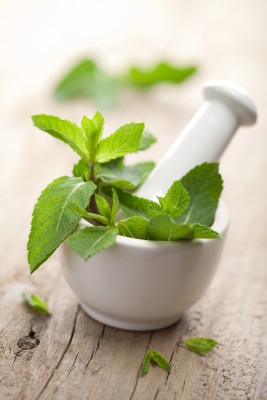Mint; one of my most favorite varieties of plant. Easy to grow, prolific, beautiful, and so many uses, from flavoring to medicinal. Lemon balm, peppermint, spearmint, pick one or pick several, I try to grow as many as I can. Lemon balm helps with anxiety and insomnia, I use spearmint to ease nausea, and all the mints are great to cook with. The kids love picking the leaves and chewing on them when out in the yard, and they are supremely easy to dry and make into teas, which makes a great gift.
From Green Med Info.com, here is a very helpful article about the many benefits of peppermint, along with cited sources for their information.
A favorite herbal medicine of the ancients, peppermint leaves have been found in Egyptian pyramids dating back to 1,000 BC. Modern scientific investigations have now confirmed that this
remarkable plant has over a dozen healing properties.
In our continuing effort to educate folks to the vast array of healing agents found in the natural world around us, we are excited to feature peppermint, a member of the aromatic mint family that you may already have squirreled away somewhere in your kitchen cupboard. While most have experienced peppermint as a flavoring agent, or perhaps as a comforting cup of herbal tea,
few are aware of its wide range of experimentally confirmed therapeutic properties.
The ancients certainly were aware of the mint family's medicinal value, having been used as herbal medicines in ancient Egypt, Greek and Rome thousands of years ago. Dried peppermint leaves have even been found in several Egyptian pyramids carbon dating back to 1,000 BC.
Today, modern scientific investigations are revealing an abundance of potential health benefits associated with the use of different components of the peppermint plant, including aromatherapeutic, topical and internal applications.
Most of the human research on peppermint performed thus far indicates this plant has great value in treating gastrointestinal disorders, including:
- Irritable Bowel Syndrome – Since the late 90's it was discovered
that enteric-coated peppermint oil capsules are safe and effective in the
treatment of this increasingly prevalent disorder.[ii] This
beneficial effect extends to the pediatric community. In one children's trial
75% of those receiving peppermint oil had reduced severity of pain associated
with IBS within 2 weeks.[iii] Another 2005 trial
in adults concluded that "Taking into account the currently available drug
treatments for IBS Peppermint oil (1-2 capsules t.i.d. over 24 weeks) may be the
drug of first choice in IBS patients with non-serious constipation or diarrhea
to alleviate general symptoms and to improve quality of life."[iv] In another
2007 trial 75% of patients receiving peppermint oil saw an impressive 50%
reduction of "total irritable bowel syndrome score."[v] Most recently, a
study published January of this year found that peppermint oil was effective in
relieving abdominal pain in diarrhea predominant irritable bowel syndrome.
- Colonic spasm – Peppermint oil has been studied as a safe
and effective alternative to the drug Buscopan for its ability to reduce spasms
during barium enemas.[vii] [viii]
- Allergic rhinitis (hay fever): A 2001 preclinical study found that
extracts of the leaves of peppermint inhibit histamine release
indicating it may be clinically effective in alleviating the nasal symptoms of
allergic rhinitis.[xiv]
case study found that topical peppermint oil treatment resulted in a near
immediate improvement of shingles associated neuropathic pain symptoms; the
therapeutic effects persisted throughout the entire 2 months of follow-up
treatment. [xv]
Peppermint is actually a hybridized cross between Water Mint (Mentha aquatica) and Spearmint (Mentha spicata),[xxvi] the latter of which has also been
researched to possess remarkable therapeutic properties, such as the ability to
exert significant anti-androgenic effects in polycystic ovarian syndrome[xxvii] and ameliorating the related condition of mild hirsutism, marked by excessive hair growth in females.[xxviii]
Like all plant medicines, extreme caution must be exercised when using extracts and
especially essential oils. Also, remember that more is not always better. A
recent study on the use of rosemary in improving cognitive performance in the
elderly found that a lower 'culinary' dose (750 mg) was not only more effective
in improving cognition (as measured by memory speed) than a higher dose, but
the highest dose (6,000 mg) had a significant memory impairing effect.[xxix] This illustrates quite nicely how less can be more, and why an occasional nightly cup of peppermint tea may be far superior as preventive strategy than taking large 'heroic' doses of an herb
only after a serious health problem sets in.
Read
more at http://www.greenmedinfo.com/blog/power-peppermint-15-health-benefits-revealed


 RSS Feed
RSS Feed